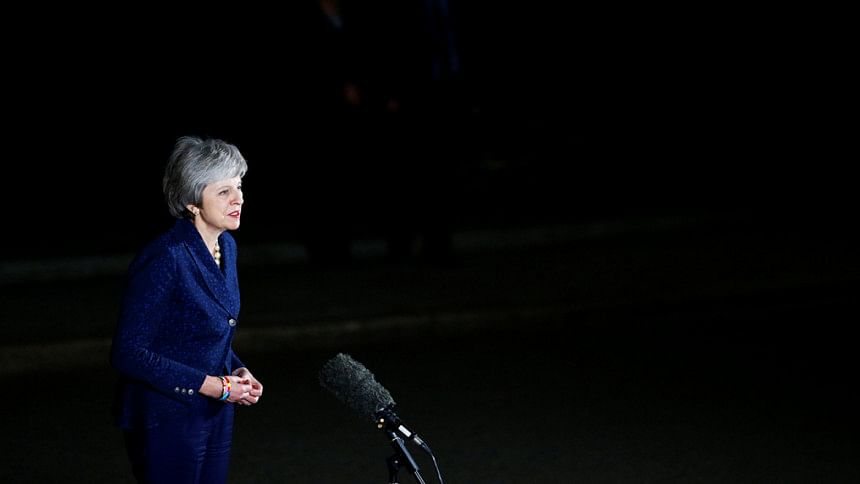Wounded May seeks EU compromise to save Brexit deal

Bloodied but not yet beaten, Prime Minister Theresa May comes to Brussels for the second time in three days on Thursday, battling to save her Brexit deal and her career.
The British leader, who survived a confidence vote staged by her own party's MPs late on Wednesday, now needs to turn a narrow victory on home turf into an unlikely away win.
May's 27 counterparts will join her in Brussels for a European Union summit less than three weeks after a November 25 meeting at which they approved the Brexit divorce papers.
The accord was hailed as the end to a 17-month negotiation, and leaders dared hope they had saved Britain from crashing out of the union on March 29 with no ongoing trade arrangements.
Also read: UK PM faces confidence vote
But when May brought the hard-fought compromise back to Britain she ran into renewed opposition from hardline Brexiteers on her own backbenches and balked at putting it to parliament.
Now she wants Europe to sweeten the offer with "reassurances" that the so-called "backstop" -- measures to prevent the return of a hard border with Ireland -- will not last indefinitely.
Negotiators said the leaders would listen to May and see what they can offer her in terms of a statement, but insist the 585-page withdrawal agreement itself cannot be renegotiated.
"The margin is really tight, it will be an exercise in presentation," one senior European diplomat confided Wednesday.
They will, however, hear May out, setting aside time on Thursday during a summit they had hoped would deal with migration, budgets and eurozone reform to talk about Brexit once again.
"The discussions in Britain... do not make the situation any easier, but we should nevertheless do everything we can to avoid a hard Brexit," Austrian Chancellor Sebastian Kurz said.
Austria holds the rotating EU presidency and Kurz arrived in Brussels ahead of the summit to talk with host Donald Tusk, the president of the European Council, about the agenda.
"It is clear that the withdrawal agreement will not be opened up and amended but there are, of course, other ways of moving towards one another that are in the interests of both sides," Kurz said.
Backstop sell-by date?
After May made a desperate three-capital European tour on Tuesday to seek assistance from fellow leaders, Tusk had said he would love to help her, but "the question is how".
On Wednesday, Kurz suggested the secret may lie in the question of the backstop.
When asked what could be clarified, he said: "For example the question: 'When does the backstop end?'."
"I think there is a certain room to move towards each other."
But determined to remain loyal to continuing member Ireland, European officials insist in public and in private that the backstop must stay. "The idea of a sell-by date won't stand," one said.
And any modification or addendum to an agreement on plans for future UK-EU relations will not be legally binding, negotiators say.
Anything May does come away with must convince her own party, its angry Northern Irish allies and a majority of British MPs to back the deal if and when it returns to Westminster.
If the agreement is still found wanting not only would Britain and its main trading partners face economic chaos, but May could be finished off by a parliamentary vote of no confidence.
On Thursday, May won the backing of 200 Conservative lawmakers, but 117 voted to oust her -- and only after she had conceded she would step down before 2022 elections.
Go to see the Queen
She said she wanted to "get on with the job of delivering Brexit", and to see "politicians on all sides coming together".
But her hardline opponents claimed the vote against her had been higher than expected and that most backback members -- who do not hold jobs in May's government -- want her gone.
"She ought to go and see the Queen and resign urgently," leading Brexit rebel Jacob Rees-Mogg told the BBC.
Eurosceptics hate the divorce deal agreed last month, which they fear risks tying Britain to the bloc for years after Brexit.
Their confidence vote followed the prime minister's decision on Monday to postpone a planned vote in the House of Commons in the face of what May feared would be a crushing defeat.
She has promised to hold that vote before January 21 -- when she may yet still lose, plunging the Brexit process into fresh crisis.

 For all latest news, follow The Daily Star's Google News channel.
For all latest news, follow The Daily Star's Google News channel. 



Comments